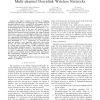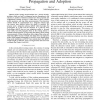INFOCOM
2010
IEEE
13 years 10 months ago
2010
IEEE
Significant research effort has been directed towards the design and performance analysis of imperfect scheduling policies for wireless networks. These imperfect schedulers are o...
INFOCOM
2010
IEEE
13 years 10 months ago
2010
IEEE
—This paper presents a novel transport protocol, CUSP, specifically designed with complex and dynamic network applications in mind. Peer-to-peer applications benefit in particu...
INFOCOM
2010
IEEE
13 years 10 months ago
2010
IEEE
—This paper considers the problem of designing scheduling algorithms for multi-channel (e.g., OFDM) wireless downlink networks with n users/OFDM sub-channels. For this system, wh...
INFOCOM
2010
IEEE
13 years 10 months ago
2010
IEEE
—False routing announcements are a serious security problem, which can lead to widespread service disruptions in the Internet. A number of detection systems have been proposed an...
INFOCOM
2010
IEEE
13 years 10 months ago
2010
IEEE
—Energy conservation is drawing increasing attention in data networking. One school of thought believes that a dominant amount of energy saving comes from turning off network ele...
INFOCOM
2010
IEEE
13 years 10 months ago
2010
IEEE
Abstract—Inspired by the recent development of optical queueing theory, in this paper we study a class of multistage interconnection networks (MINs), called twister networks. Unl...
INFOCOM
2010
IEEE
13 years 10 months ago
2010
IEEE
Abstract— In conventional wireless systems with layered architectures, the physical layer treats all data streams from upper layers equally and apply the same modulation and codi...
INFOCOM
2010
IEEE
13 years 10 months ago
2010
IEEE
—In many envisioned mobile ad hoc networks, nodes are expected to periodically beacon to advertise their presence. In this way, they can receive messages addressed to them or par...
INFOCOM
2010
IEEE
13 years 10 months ago
2010
IEEE
—Phishing has been easy and effective way for trickery and deception on the Internet. While solutions such as URL blacklisting have been effective to some degree, their reliance ...
INFOCOM
2010
IEEE
13 years 10 months ago
2010
IEEE
—This is by far the first paper considering joint optimization of link scheduling, routing and replication for disruption-tolerant networks (DTNs). The optimization problems for...


